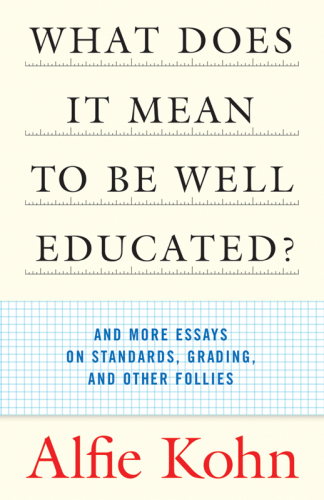
What Does It Mean to Be Well Educated?
And More Essays on Standards, Grading, and Other Follies
کتاب های مرتبط
- اطلاعات
- نقد و بررسی
- دیدگاه کاربران
نقد و بررسی

April 5, 2004
If general readers recognize Kohn's name, it's thanks to his campaign against standardized testing (The Case Against Standardized Testing
). Educational professionals will recall Kohn's insights into classroom management (Punished by Rewards
) and school reform (The Schools Our Children Deserve
). This collection of essays, written from 1999 to 2003, proves the author is one of America's most astute critics of current educational policies. Kohn revisits the standards and testing mania, but also takes on other controversial issues: grade inflation, school violence and how educators can deal with the aftermath of 9/11. "Turning Learning into a Business" is an informative and incisive critique of the many ways in which Kohn sees the corporate world exploiting kids and profiting from schools through the marketing of tests, advertising in schools and textbooks, and turning schools into for-profit businesses. Kohn carefully links these issues to larger social concerns: "one of the most crucial tasks in a democratic society" is "the act of limiting the power that corporations have in determining what happens in, and to, our schools." Kohn is unapologetic and articulate about the advantages of a progressive approach to education that values students' interests, focuses on understanding (rather than the acquisition of isolated facts) and assesses student work authentically (rather than by single, standardized measures). True to his educational philosophy, he asks readers to consider big questions, such as: What's important to know? What are the qualities of a good school? And perhaps most vital, Who gets to decide and who benefits?

April 15, 2004
How much does someone need to know to be considered well educated? And who gets to decide what it means to be well educated? Kohn (Punished by Rewards) here analyzes these and other questions regarding education. As he did in What To Look for in a Classroom, Kohn gathers several of his essays concerning how educators currently assess students' learning. In "Turning Learning into a Business," he debates corporate sponsorship in schools, including advertisements on buses, soft drink companies' incentives for exclusive rights on campus, Channel One's stories and ads, brand-name placement in textbook problems, and lessons underwritten by companies that use their products. He sees this trend as threatening the basic reason for education: to teach students to think for themselves. Other pieces question standardized testing as the best way to measure a student's intelligence and describe studies that have shown grades to be unreliable indicators of what a student has learned. Kohn aims to inspire readers to question current education practices and believe in the possibility of constructive change. For academic and larger public libraries.-Terry Christner, Hutchinson P.L., KS
Copyright 2004 Library Journal, LLC Used with permission.

























دیدگاه کاربران